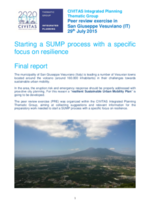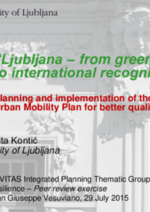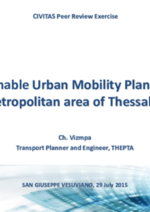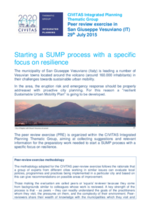Starting a SUMP process with a specific focus on resilience: peer review exercise in San Giuseppe Vesuviano (IT)
SAN GIUSEPPE VESUVIANO, ItalyOther
The municipality of San Giuseppe Vesuviano (Italy) is leading a number of Vesuvian towns located around the volcano (around 160.00 inhabitants) in their challenges towards sustainable urban mobility.
In the area, the eruption risk and emergency response should be properly addressed with proactive city planning. For this reason a “resilient Sustainable Urban Mobility Plan” is going to be developed.
In this respect, a peer review exercise (PRE) was organized within the CIVITAS Integrated Planning Thematic Group on 29th July 2015, aiming at collecting suggestions and relevant information for the preparatory work needed to start a SUMP process with a specific focus on resilience.

The Greek city of Thessaloniki has recently developed a SUMP following the European guidelines. The city is also one of the 100 resilient cities, even if the concept of resilience has not been fully included in mobility planning (yet).
The formerly CIVITAS demonstration city of Ljubljana (Slovenia) also has recently developed a SUMP, achieving very good results and winning, among other achievements, the European Mobility Week Award.
Representatives from the Thessaloniki's Integrated Transport Authority (ThePTA), the Hellenic Institute of Transport - Centre for Research and Technology Hellas (HIT/CERTH) and the City of Ljubljana were invited to be the peer reviewers of San Giuseppe Vesuviano.
Peer-review methodology
The methodology adopted for the CIVITAS peer-review exercise follows the rationale that a group of experts from different cities working in similar issues can evaluate local policies, programmes and practices being implemented in a particular city and based on this can give recommendations on possible areas of improvement. The assessment is done in a structured and focused way, following a common standard (‘benchmark for integrated learning’).
Those making the evaluation are called peers or ‘equals’ reviewer because they come from backgrounds similar to colleagues whose work is reviewed. A key strength of the process is that – as peers – they can readily understand the goals of the practitioners whom they visit, the pressures on them, and the complexity of their environment. Peer-reviewers share their wealth of knowledge with the municipalities which they visit and review.
They take back to their municipalities knowledge from the places they visit, strengthening their understanding. This methodology thus offers them an opportunity to exchange skills and experiences, and to reflect on their own work.
Agenda
9:00-9:30 | Welcome addresses and brief introduction |
9:30-11:30 | Technical visit: the Vesuvian area, context and challenges |
11:30-12:00 | Sustainable Urban Mobility Planning and resilience: problem statement |
12:00-12:30 | Drafting a Sustainable Urban Mobility Plan for the Vesuvian Area: first steps |
12:30-14:00 | Lunch break |
14:00-14:30 | Sustainable Urban Mobility Plan for the Metropolitan area of Thessaloniki |
14:30-15:00 | Smart and Resilient Urban Mobility Planning in Thessaloniki |
15:00-15:30 | Coffee break |
15:30-16:00 | Ljubljana – from green vision to international recognition: Planning and implementation of the SUMP for better quality of life |
16:00-16:30 | Peer-review exercise results and recommendations. Discussion and conclusion coordinated by CIVITAS WIKI |
16:30 | Closing |
Author: Luigi Acquaviva














